


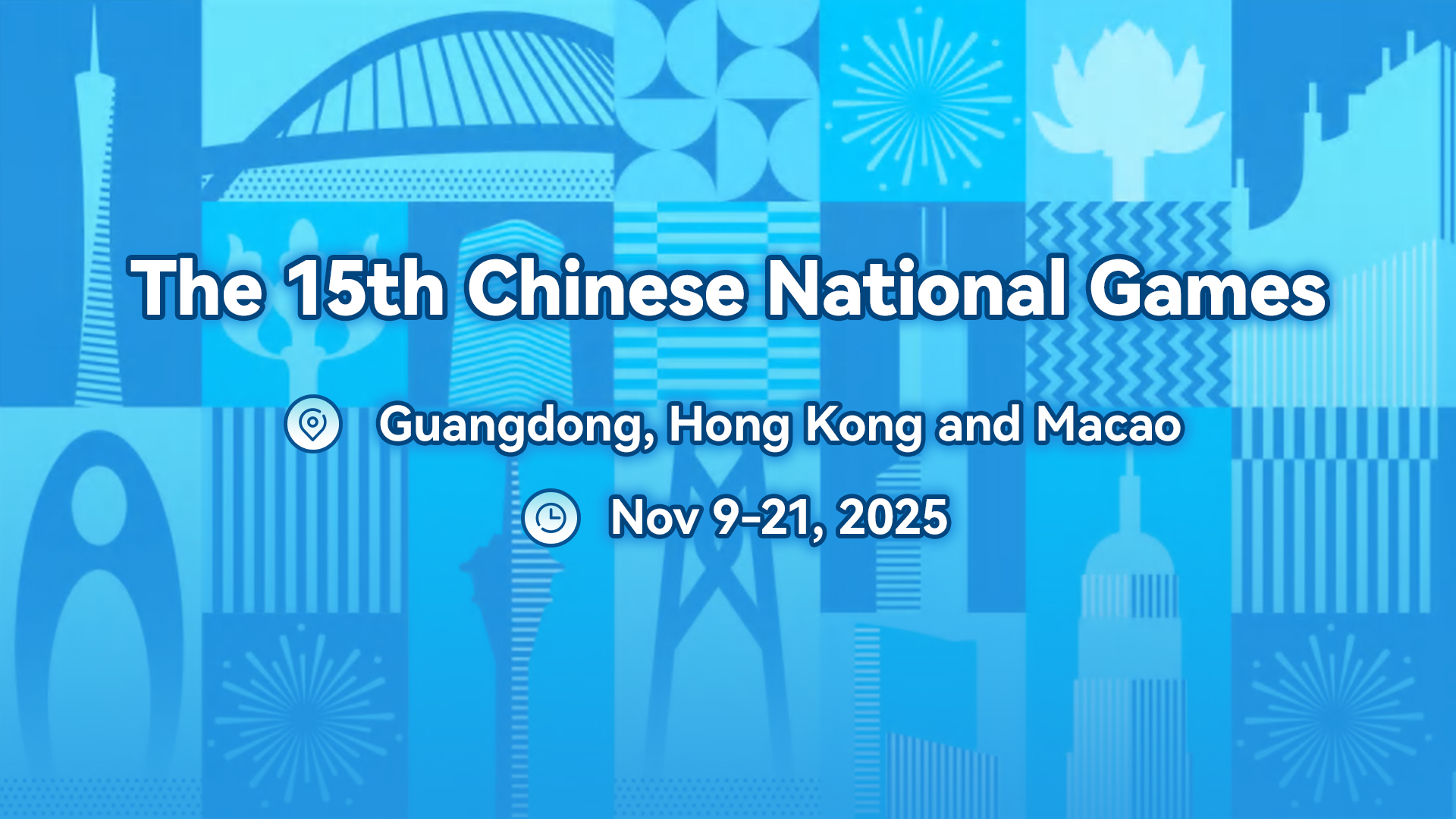
China's 15th National Games will open on Nov 9 across the Guangdong-Hong Kong-Macao Greater Bay Area, marking the first time three regions have co-hosted the country's premier multi-sport event.
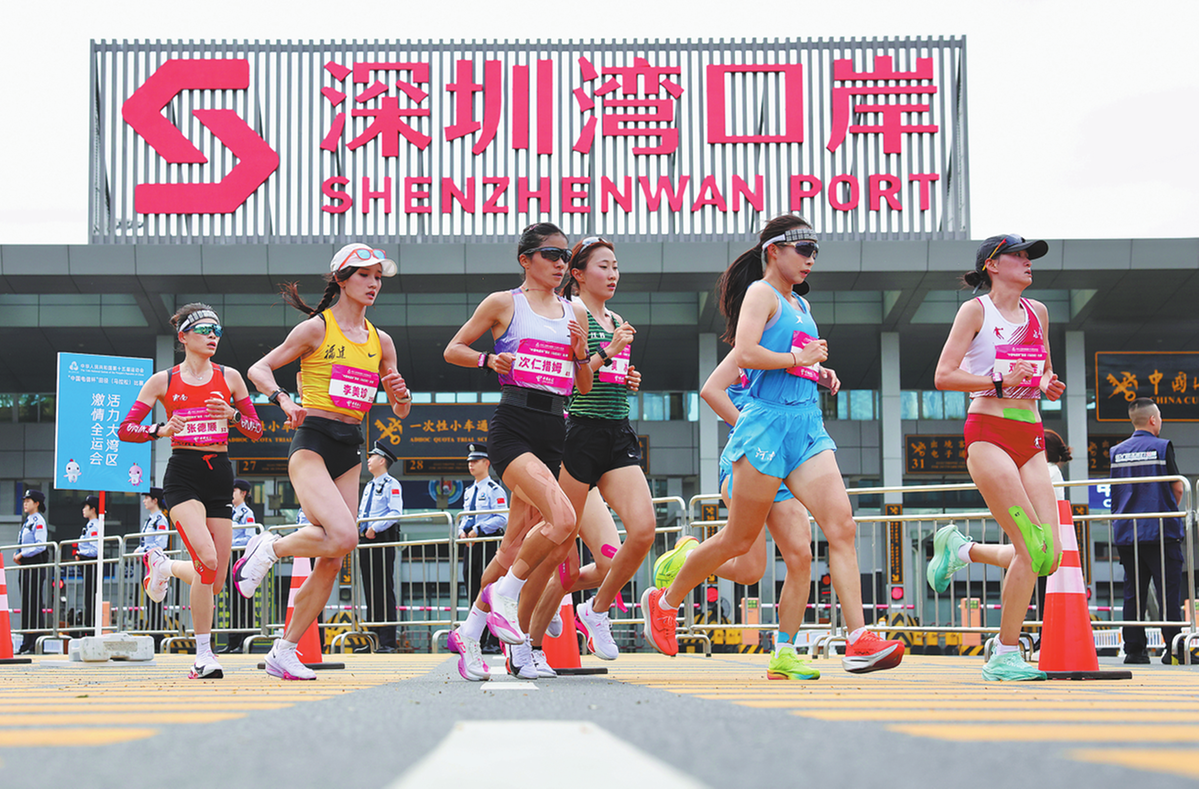
Running on the scenic Shenzhen Bay Bridge, cool sea breeze in their hair, was undoubtedly the highlight of the first cross-boundary marathon in China's historic 15th National Games, said athletes who participated in the 42-kilometer race that included the 5.5-km bridge connecting Guangdong province with the Hong Kong Special Administrative Region.
The sporting extravaganza, which is being co-hosted by Guangdong and Hong Kong and Macao SARs, is making people at home and abroad better understand how integrated the Guangdong-Hong Kong-Macao Greater Bay Area has become, they added.
He Jie, an athlete from the Ningxia Hui autonomous region, who clocked 2 hours 12 minutes 7 seconds to clinch gold on Saturday in the men's marathon, said the race was a new and special experience for him.
"I've never taken part in a cross-boundary marathon before, and my first impression was that all the infrastructure, including the cross-sea bridge, is so nice. I've traveled around the world to run marathons, but the design and the infrastructure of the course here is hard to beat," said He, who holds the current national record in men's marathon and is also an Asian Games gold medalist.
The athlete, who trained hard in Kenya to represent his home region Ningxia in the National Games, became visibly emotional after crossing the finish line. "I will come back in my own time to take a good look at the beautiful landscape along the route," he said.
The marathon's starting point and finish line were the Shenzhen Bay Sports Center. Runners entered Hong Kong through the Shenzhen Bay Port, crossed the Shenzhen Bay Bridge and Kong Sham Western Highway Viaduct, and then turned back and returned to Shenzhen through the same route.
Zhang Shunde, an athlete from Yunnan province, who clocked 2:30:20 to win the women's marathon gold, said the course was dotted with iconic landmarks of Shenzhen and Hong Kong, making it an extraordinary experience.
"Although I was focused on the race, I couldn't help but notice how blue the sea was. The environment and the design of the entire course ... are definitely among the highlights of this year's National Games," she said.
Lu Ying, from Henan province, who finished the marathon in 2:30:44 and won bronze, said it was exciting to cross the boundary between Shenzhen and Hong Kong without having to slow down even a bit.
"I've never run through the checkpoints before. With this wristband, we automatically completed the boundary check procedure without stopping. It's such a unique experience," she said, pointing to the band on her left wrist equipped with radio frequency identification tags.
Tech boost
Kuang Bing, deputy executive director of the Executive Committee for the Shenzhen Competition Zone of the 15th National Games, said that RFID readers connected to the Beidou Navigation Satellite System have been installed at checkpoints to instantly verify registered athletes' names and other details, which are stored in the tagged wristbands.
The system ensures zero contact and zero delay, he said. "We've introduced smart customs clearance, ensuring athletes experience no waiting time at Shenzhen Bay checkpoints. Also, we have adopted a preclearance and closed-loop arrangement throughout the event."
Kuang highlighted the use of advanced digital technologies to monitor the event in real time. "We used facial recognition to identify athletes and real-time GPS tracking to monitor both runners and vehicles. Drones offered live coverage to support race management and emergency response," he said.
More important, Shenzhen established a multichannel and multilevel communication mechanism with the marathon organizers in Hong Kong, which ensured thorough coordination in areas such as course management and comprehensive support, achieving seamless connectivity and professional collaboration in event organization, Kuang said.
"The event served as an important window to highlight the vitality of integration in the Greater Bay Area," he added.
Lam Wing-cheung, an athlete from Hong Kong, said that slopes along the course and crosswinds made the race more challenging.
"It was nevertheless a very good experience for me, because it was my first time participating in the National Games," said Lam, who finished in the 19th place.
Bridging bonds
With connectivity in the Greater Bay Area significantly enhanced in recent years, exchanges among athletes have also advanced, he said. "I often train with athletes from Macao and take part in marathons held on the Chinese mainland, which have helped to improve my performance."
Leanne Szeto from Hong Kong, who finished 27th in the women's marathon, said she hopes that more cross-boundary races are held in the Greater Bay Area in the future.
"When I was a child, going to Shenzhen with my parents meant waiting in long lines, but now we can just use gates equipped with facial recognition technology. Also, I never imagined t-hat one day I would be able to run back and forth between Shenzhen and Hong Kong," she said.
Zhang, the women's marathon gold medalist, said the competition provided athletes from the Chinese mainland, Hong Kong and Macao with the opportunity to come together.
"By competing on the cross-boundary course, we inspired each other and became more united, just like the Greater Bay Area," she said.
The marathon is among the two cross-boundary disciplines in the ongoing 15th National Games. The men's individual road cycling race, which covered Guangdong's Zhuhai, and Hong Kong and Macao SARs, was held on Nov 8.
cuijia@chinadaily.com.cn

MACAO - Shanghai's Fan Zhendong beat Lin Shidong of Hainan 4-1 to defend the table tennis men's singles title at China's 15th National Games here on Sunday.
Despite a slow start, Fan came back from 9-4 down to pocket seven points in a row to clinch the first game 11-9.
Lin, 20, won the second game 11-8, but 28-year-old Fan was unstoppable afterwards, taking the next three games 11-5, 11-3, 11-4 for the gold.
"At the beginning, I didn't feel at ease. I continued to elevate my performance and felt delighted to seize the gold," Fan said after his fourth appearance in the singles final at the National Games.

"Each Games tells a new story at different stages of my career. It is always difficult to top the podium at the National Games. What I need to do is to keep improving my skills and mentality. My next goal is to help Shanghai achieve a great result in the team event," Fan said.
At the Paris 2024 Olympic Games, Fan won both the men's singles and team gold medals, becoming the 11th player in history to achieve a career Grand Slam of Olympic Games, World Championships, and World Cup.

Despite a runner-up finish, Lin already made history, becoming the first Hainan paddler to reach the final at the National Games.
"This medal has exceeded my anticipation. I am satisfied with my performance, feeling proud to win the honor for my hometown," said Lin.
Earlier in the day, world No. 1 Wang Chuqin of Beijing cruised past Liaoning's Yuan Licen 11-9, 11-8, 4-11, 11-5, 11-7 to secure bronze.



GUANGZHOU -- China's National Games held its first-ever cross-boundary marathon on Saturday, with both men's and women's races run on a course spanning Shenzhen in Guangdong Province and Hong Kong.
China's national record holder He Jie of Ningxia pulled away near the 35-kilometer mark and held the lead to finish in 2:12:07. Gao Peng of Yunnan finished seven seconds behind to take silver, while the bronze went to Wu Xiangdong of Anhui in 2:12:33.
"I finished fourth at the last edition of the National Games four years ago, which was hard to accept," said the 26-year-old He. "I ran many races in the past four years, and I won gold at the Asian Games in Hangzhou. But today's gold made me the happiest."
After twice improving the national marathon record, which currently stands at 2:06:57, He did not hide his ambition to break it again.
"My next goal is to break the 2:06:00 barrier. That's the dream for me and my coach," he said.
In the women's race, defending champion Zhang Deshun of Yunnan broke away from a three-runner leading pack after 40 kilometers and finished in 2:30:20, holding off her rivals by five seconds. Ciren Cuomu was second, followed by Lu Ying of Henan in 2:30:44.
A total of 71 athletes competed, including five from Hong Kong and one from Macao. The 42.2-kilometer course ran through Shenzhen's Nanshan District and Hong Kong's Yuen Long District. The Shenzhen section was 20.3 km and the Hong Kong section 21.9 km, with the start and finish in Shenzhen.
The marathon featured facial recognition technology and "zero delay, zero contact, zero waiting" customs clearance for personnel, vehicles and materials to ensure smooth operations.
In addition to staging the first cross-boundary marathon, the National Games debuted the mixed 4x100 meters relay at the Guangdong Olympic Sports Center, where in-stadium athletics events also began on Saturday.
The Fujian team, consisting of Lin Yuwei, Ge Manqi, Xiao Yuanpeng and He Jinxian, stormed to a national best mark of 40.37 seconds to win the new event, which has been included in the program of the Los Angeles 2028 Olympic Games. The relay features a running order of woman, woman, man, man.
Sichuan finished second in 40.78 and Hubei third in 40.92.
In the 4x400m mixed relay final, pre-race favorite Guangdong held off a strong challenge from Sichuan to win in 3:17.54, while Sichuan clocked 3:17.66 and Hebei finished third in 3:19.99.
Tourism in the Hong Kong Special Administrative Region is surging on the back of the 15th National Games being held from Nov 9 to 21.
As one of the three co-hosts of the games, together with Guangdong province and the Macao SAR, Hong Kong will stage elite sports events such as basketball, track cycling, triathlon and golf, which are anticipated to draw in crowds.
Hotel bookings, attraction visits and sales of games' merchandise have all seen a spike in early November, said industry insiders.
Hotel demand has risen year-on-year, with citywide occupancy hitting about 70 percent by mid-November, according to Timothy Chui, executive director of the Travel Industry Council of Hong Kong.
Christina Cheng, general manager of the Fullerton Ocean Park Hotel Hong Kong, has noticed a marked increase in guests. "We believe the tourism uplift brought about by the National Games will extend beyond the immediate period and generate a steady, positive impact," she said.
"Roughly 35 percent of our guests are currently from the Chinese mainland," Cheng added.
The Hong Kong Tourism Board has estimated that the games would attract more than 100,000 additional visitors to the city.
Travel businesses have moved quickly to tailor services, with operators widening offerings beyond simple ticketing to include transportation, non-competition itineraries and centralized hotel reservations, said Chui from the Travel Industry Council of Hong Kong.
China Travel Service (Hong Kong) has launched combo tickets linking the games' rugby sevens events with visits to Ocean Park, or fencing tickets with Ngong Ping 360 cable car rides.
"The National Games have deepened integration across Guangdong, Hong Kong and Macao," said Secretary for Culture, Sports and Tourism Rosanna Law Shuk-pui. "Guangdong agencies are offering 'Follow the National Games, Tour the Greater Bay Area' routes — diving in Guangdong today, table tennis in Macao tomorrow, fencing in Hong Kong the next day — bringing 'one trip, multiple destinations' to life. And with November being Hong Kong's peak season, visitors will have a wealth of options."
Liu Jiapeng, a public affairs manager at travel portal Trip.com Group, said the games have lifted travel search interest across the Guangdong-Hong Kong-Macao region, with particularly noticeable jumps in queries for hotels near competition venues in Macao and for attractions such as Hong Kong Disneyland and Ocean Park.
Official merchandise is also selling briskly.
Hong Kong Post Office, one of the licensed retailers, reported that products blending mascot designs and local cultural elements were especially popular. These included blind-box plush toys created for the Hong Kong events, tote bags printed with the mascots, keychains featuring magnetic table tennis rackets, and pins and magnets showcasing the city's iconic landmarks.
Each event brings more than ticket revenue, Law added, it activates the entire value chain — from staging and security to catering, hospitality and retail — supporting thousands of jobs. "This truly fulfills the idea of 'one event, benefiting the entire city'. The live broadcasts of many events also showcase Hong Kong's major attractions, offering a prime opportunity to highlight the city's tourism appeal."
akirawang@chinadailyhk.com
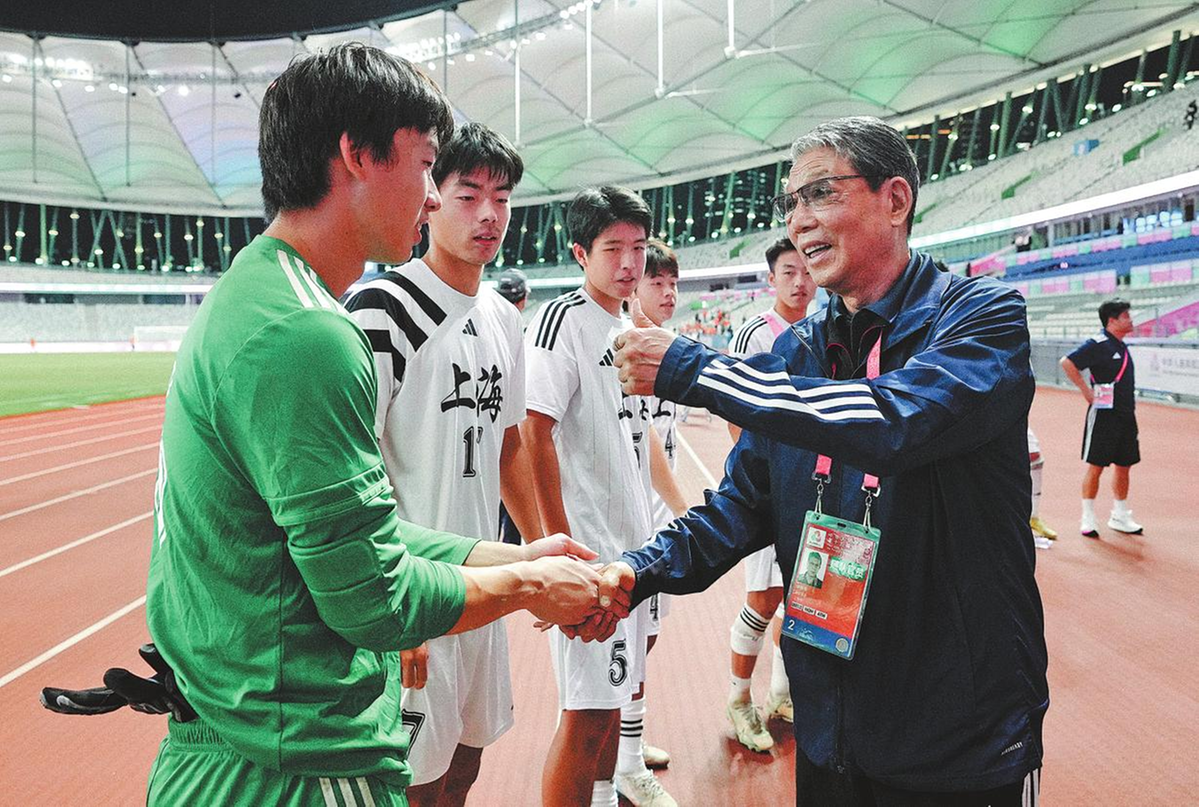
At 81 years old, veteran soccer coach Xu Genbao has no plans to give up his coaching career, even after failing to lead the Shanghai team to the gold medal in the men's under-20 soccer category at the 15th National Games.
"Why should I call it a final curtain? I can still train young players," said Xu, pausing for a moment and responding firmly to reporters, after the Shanghai team claimed bronze.
At the Bao'an Sports Center in Shenzhen, Guangdong province, on Wednesday evening, the Shanghai team, led by Xu, defeated Shandong 5-4 in a penalty shootout in the men's under-20 soccer bronze medal match.
The Hubei team defeated Guangdong 6-4 in the final, earning the province its first-ever gold medal in the games' men's under-20 soccer history.
Before the opening of the games, jointly hosted for the first time by Guangdong, Hong Kong and Macao, Xu took on the role of head coach of the Shanghai team once again, with many considering that it might be the final outing in his legendary coaching career.
"This time, I am very eager to lead the team to win the gold medal, as the weight of a silver or bronze medal is quite different," said Xu before the games.
Given that most of the team's players only trained together for a month before the opening of the games, Xu still believed the final result was acceptable.
In the semifinals against host Guangdong, the Shanghai team's gold medal dream came to an abrupt end when an unnecessary foul gave the opponents a penalty kick in the 87th minute.
"I stood for 90 minutes, constantly shouting — my players might not have heard me," said Xu.
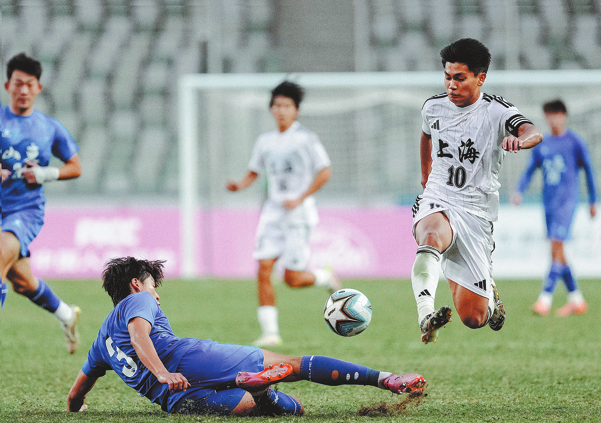
Due to an unfavorable draw, the Shanghai team played five matches in 10 days, the most intensive schedule in the game's men's under-20 soccer match calendar, with key players like Li Xinxiang and Liu Chengyu playing until they were injured.
Xu admitted that he was "a bit tired". "The past two weeks have been really exhausting, with meetings, training and matches held every morning and afternoon — after all, I'm 81 years old," he said.
The coach has developed a long history with the games. At the fourth edition in 1979, Xu led the Shanxi team to the top eight.
He led the Shanghai team to win the gold medal in the under-20 men's soccer event for the first time at the 11th edition of the games in 2009, held in Shandong province.
In the subsequent two games held in Liaoning province and Tianjin in 2013 and 2017, respectively, the Shanghai team, also led by Xu, achieved a hat-trick in the soccer event by winning the gold medal three times in a row.
As a representative figure in China's youth soccer training, Xu established a training base in Chongming, Shanghai, in 2000, which has helped develop and supply a large number of players to various national teams.
Renowned players developed by the training base include key national team members such as Wu Lei, Zhang Linpeng, Yan Junling and Zhu Chenjie. Among them, Wu Lei, who played for Espanyol in La Liga for over three seasons, has become a leading figure in the national team.
In discussing his coaching career, Xu has said on several occasions that if Chinese soccer does not rise to prominence, he cannot consider himself successful.
"We cannot claim success — we can only say that we have made an effort. For me, I can be considered a hardworking coach," he said.
Considering his old age, some people might question Xu's technique and tactics, which focus on pressing, forcing and surrounding.
"Some people say I'm outdated, but they don't know that I watch Manchester City and Barcelona matches quite often — the concepts of pressing, forcing and surrounding and receiving, passing and turning are quite close to the world's advanced ideas," he said.
After coaching for more than four decades, Xu hopes to find someone who can take over from him.
"If younger players show their talent and the team is good, I will coach again, although I won't have as much energy as I did before," he said.
"I hope that in the future, the national soccer team will produce some true stars who have the ability to qualify for the World Cup," Xu added.
qiuquanlin@chinadaily.com.cn
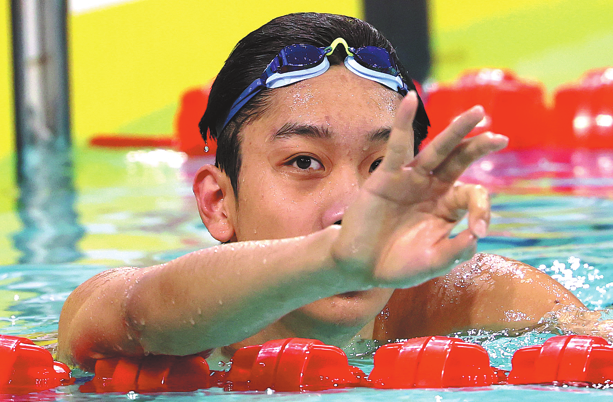
For rising swimming sensation Zhang Zhanshuo, going up against Chinese titans of the pool Sun Yang and Pan Zhanle at the 15th National Games in Shenzhen, Guangdong province this week, must have been nerve-racking.
But for the cool-headed 18-year-old Shandong native, he converted any nerves into wins and broken records.
Zhang has become one of the shining stars of the National Games in Shenzhen, capturing gold in the men's 400m, 200m and 800m freestyle events — breaking the national youth record in all three.
His rapid rise has positioned him as China's most promising new force in men's mid— and long-distance freestyle, and a major medal hope for the 2028 Los Angeles Olympics.
After winning gold in the men's 800m freestyle on Thursday night, Zhang celebrated by holding up three fingers in the pool — signifying his third individual gold medal of the games.
The pragmatic and humble teenager remained modest afterward, saying that his performance in the pool hadn't improved significantly and that he would need to reflect carefully after the event.
"Like I said on the first day, I never think about what it would mean if I win or don't win. I just want to face everything as a challenger. For me, the most important thing is to do my best and set a good example," Zhang said.
This is Zhang's first appearance at the National Games, and the young athlete hasn't cracked under the pressure of competing against his senior teammates. On the opening day, he stunned the crowd by defeating Sun and Pan in the men's 400m freestyle, winning in 3:42.82 — a new world junior record.
Zhang later admitted that he had not set any expectations for his time before the race.
After the race, three-time Olympic gold winner Sun was generous with his praise for the young swimmer.
"I think Zhang is an excellent athlete. He has a long future ahead of him. I hope he takes every step well and carries the future of China's men's mid— and long-distance freestyle," he said.
Two days later, he repeated the feat in the 200m freestyle, again beating Sun and Pan and clocking 1:44.86, just 0.14 seconds shy of Romanian David Popovici's winning time at the Paris Olympics last year.
After each victory, however, Zhang has displayed a composure far beyond his years. "Once you step off the podium, everything starts again from zero," he said after the race.
Despite the soaring expectations, Zhang has remained firmly on the ground. "There are still many top swimmers in this event. I'm very satisfied with my performance today. The key is to stay calm.
"Just because you swim a good time at a big meet doesn't mean you forget who you are. You have to stay grounded."
He also stressed the value of hard work over talent, saying: "There are many people with more talent than me. You have to give up certain things — give up playtime, give up distractions. Only when you give up can you gain."
Zhang openly calls Paris 100m freestyle gold winner Pan his idol, saying that as a newcomer, he has not yet reached that level and still needs to keep chasing higher goals.
"I'm happy, but there's really nothing to celebrate. Yu Zidi is only 13 and already broke the Asian record. I still need to learn from others. It's the younger generation who will carry the future of mid— and long-distance freestyle," he said.
Ji Xinjie, who won silver in men's 200m freestyle, also spoke highly of Zhang. "I'm really happy to see him achieve such great results. I've always believed he has unlimited potential. For the Chinese swimming team, he is an invaluable asset," he said.
Away from the pool, Zhang remains a cheerful teenager. After winning a gold medal earlier, he playfully grabbed a microphone from State broadcaster China Central Television and began interviewing Ji. "How do you feel?" he asked. As a journalism student at Fudan University, Zhang got a taste of being a reporter ahead of time.
Born in 2007, Zhang began swimming at age 6. With both talent and determination, he quickly made a name for himself. His coach, Lin Yiming, said that at age 6, Zhang represented his district at the Qingdao city games in Shandong and won seven gold medals in individual events.
"This kid is hardworking — really hardworking. He's extremely disciplined and works harder than other children," Lin said. "He's only 18. His golden period will last about 10 more years. I hope he wins an Olympic gold one day."
His athletic roots run deep. Zhang's mother, Ding Lina, was a middle— and long-distance runner for the Shandong track and field team, and his father is also a sports enthusiast. Ding said she sent him to learn swimming years ago simply to improve his health, never expecting it would lead to where he is today.
"I often tell him that as a national athlete, he must go beyond personal ambition and think of the 'big national interest'. He must pursue excellence and win glory for the country. In our family, we understand that every honor is a new starting point," Ding said.
Despite his young age, Zhang is already familiar with the international stage. At the 2024 World Aquatics Championships in Doha, Qatar, he teamed up with Ji, Wang Haoyu, and Pan to win gold in both the men's 4X100m and 4X200m freestyle relays.
This August in Singapore, Zhang partnered with Ji, Pan, and Wang Shun to win silver in the men's 4X200m freestyle relay at the World Aquatics Championships.
Zhang's schedule at the National Games is far from over. He is still set to compete in the men's 1500m freestyle, 400m individual medley and 4X100m medley relay. For China's newest swimming prodigy, his moment in the spotlight has only just begun.
liyingxue@chinadaily.com.cn

Gu Zhanzhao from Team Shanghai chose a particularly triumphalist piece of music from the movie The Hunger Games for his freestyle routine with his horse Qumulus-Quintus Ah in the equestrian dressage individual final at the 15th National Games in Guangdong province on Wednesday.
Meanwhile, his teammate Xu Mofei chose the song We Will Rock You by Queen for her routine, because, she noted, her horse Hao Hao, with whom she has partnered since June 2023, always enters the arena with a bang.
The duo did indeed rock the Shenzhen Guangming International Equestrian Center on Wednesday, snatching silver in the individual event with 69.520 points.
As well as making a statement with their unconventional choice of music, the 17-year-old Gu said that the nation's young riders have also laid down a marker at the equestrian center, underlined by the likes of Xu who made it onto the podium, adding: "Furthermore, the new generation of Chinese riders are ready to wow the world."
On Monday, the four riders of Team Shanghai, with an average age of just 20, had already taken the team event by storm, winning gold with a total score of 202.470 points, while the Xinjiang Uygur autonomous region and Guangdong teams took the silver and bronze medals, respectively.
Gu, 17-year-old Xu and Wu Yue, 20, also made it to the individual final.
All three riders have been receiving quality systematic training in Europe, which has given them the opportunity to learn the latest techniques from the best in equestrian field from an early age, said Gu, who has been training and competing in dressage in Germany and the United States for three years.
"Equestrian sports, including dressage and show jumping, have become increasingly popular in China in recent years, and many young people have taken up equestrian events and started to train overseas. The results are now starting to show," Gu said.
Influenced by his father — a longtime dressage enthusiast — Gu fell in love with the event when he was just a child. Supported by his family, he now has five horses in Europe and six in Shanghai he trains with, and his passion and determination to excel in the sport has continued to grow. "When I train and compete in Europe, I often find people don't take young riders from China seriously, so I want to work hard and change their perception," Gu said.
"The older generation of riders look to control the horses, but we have learned to communicate with them," explained Xu. "I know Hao Hao is tired when he rubs my shoulders with his nose."
"We also want to contribute to the development of China's promising equestrian industry by bringing back new concepts and training techniques from Europe, especially in emphasizing the attention to detail and the training of young horses," Xu, who has been training in the Netherlands and Belgium, added.
Wu, who trains in the United Kingdom and is currently studying at a university there, said young Chinese riders have already started to shine on the international stage.
"By receiving systematic training overseas, or with foreign coaches, young riders can progress quickly. More importantly, they can ensure that we are on the right track from the very beginning," he said.
Individual gold medalist and two-time team silver medalist, Liu Tao, said he's glad to see the young riders perform well in Shenzhen and become strong competitors.
"Unlike a lot of us older riders, who had to keep adjusting our training techniques and correcting mistakes made when we were young, they have had the opportunity to work with top coaches and horses in Europe from the start," said the 37-year-old Team Xinjiang veteran, who won his first individual National Games title at the 12th edition, held in Liaoning province, in 2013.
"Their full potential is yet to be unleashed," he promised.
Liu said he, too, will keep competing, saying he would like to continue for another 20 to 30 years.
Gu welcomed the move: "I really admire the veterans for their courage to keep going. This kind of spirit is truly rare and valuable."
Gu added that, like Liu, the younger generation of riders all share the same goal: "We are all training hard to see the Chinese national flag being raised at international equestrian competitions, including the Olympics."
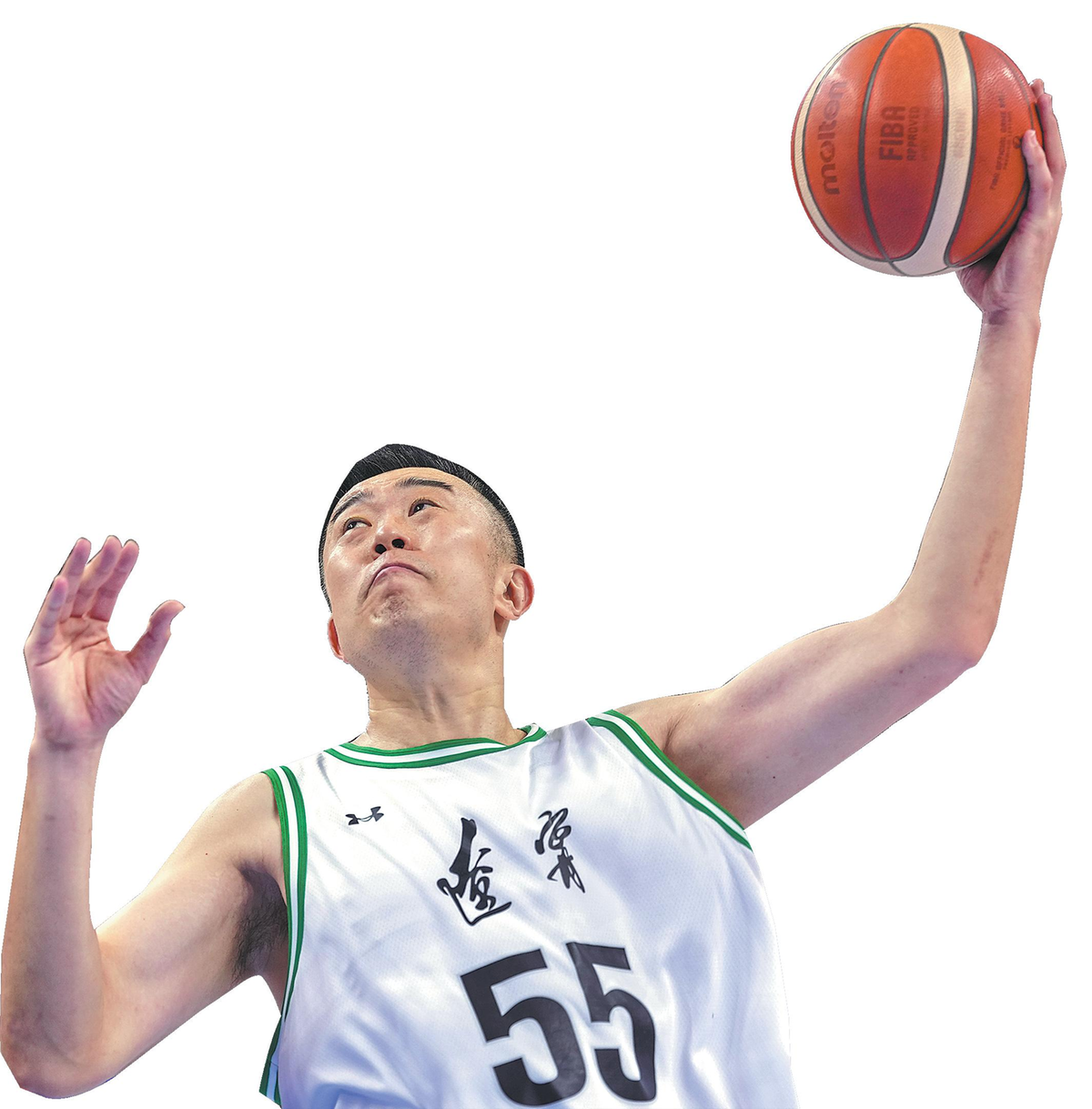
Every time basketball veteran Han Dejun is substituted during a game, he has a ritual: a salute to the crowd in a different direction. On Wednesday, in the men's bronze-medal match of the 15th National Games in Dongguan, Guangdong province, Han gave his final salute.
At 38, Han officially retired after the match, in which Liaoning lost 60-81 to Sichuan and missed out on a podium finish. In the gold-medal game, host Guangdong defeated Zhejiang 101-65, ending a 12-year wait to reclaim its National Games crown. At the previous two editions of the Games, its tilt at gold fell short, and Liaoning took the title both times, beating the Xinjiang team in 2017 and Guangdong in 2021.
This time around, though, the pair met in the semifinals. Guangdong's 92-73 victory over Liaoning has been hailed by fans as the two sides' most significant showdown over the past decade.
From 2013 to now, four National Games titles have been divided between Liaoning and Guangdong. The CBA champion sides, the Liaoning Flying Leopards and Guangdong Southern Tigers, have each won four championships. At its peak, the rivalry was celebrated by fans as the "Spring Festival gala of Basketball".
The epic rivalry has long transcended pure sport, becoming a symbol of Chinese basketball and a witness to the growth of a generation of players.
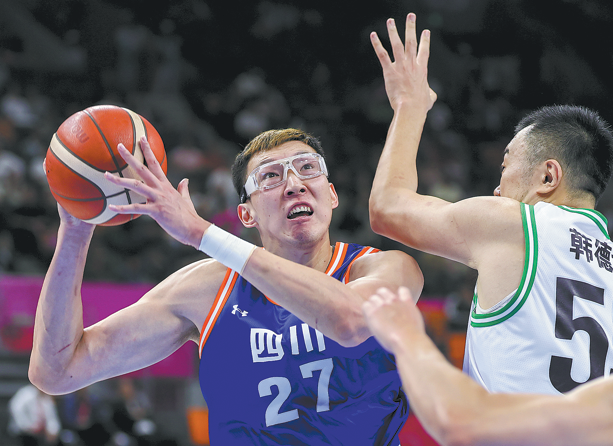
With Han's retirement, Liaoning faces the challenge of a generational transition, alongside the rise of teams like Zhejiang. The era of Liaoning-Guangdong supremacy is largely over, and the battle for dominance in Chinese men's basketball is entering a new chapter.
"Things have changed," said Guangdong head coach Du Feng after defeating Liaoning in the semifinals.
"The last National Games are still fresh in the memory. Liaoning relied on first-team national players like Zhou Qi, Han, Li Xiaoxu and Guo Ailun to win the championship. We had 'the black-white-short trio' of Zhao Rui, Hu Mingxuan and Xu Jie. All three of them are still playing, now four years older, and have become core members of the national team, receiving the baton from their predecessors," Du said.
"I think this is the essence of basketball inheritance, and also the mission of those devoted to the sport. I hope everyone involved in basketball can dedicate their efforts to the career they love."
Liaoning head coach Yang Ming, who transitioned from player to coach and has witnessed the rivalry on both sides of the paint, reflected on the significance of the matchup.
"The 'Liaoning-Guangdong' debate has been a heated one over the past decade. During this period, both teams produced many brilliant games. They won and lost against each other, needled each other, but cherished and enjoyed their time together," he said.
"Whether we'll see another rivalry at the same level in the future is hard to say, but I hope everyone remembers this wonderful period."
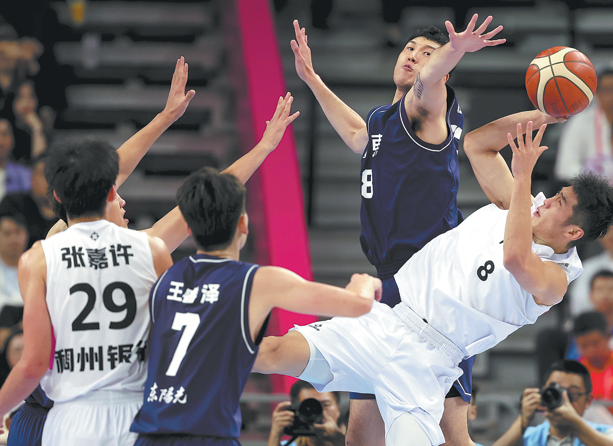
The Liaoning-Guangdong rivalry has mirrored the evolution of Chinese basketball. Beyond a clash of northern and southern styles, it has showcased tactical innovation, talent development and industry growth, becoming a national basketball event that carries both fan passion and regional culture.
Liaoning is known for its size and strength in the paint and defensive intensity, reflecting the resilience of Northeast China. Guangdong excels in fast transitions and smooth passing, highlighting southern teams' speed and strategy. These contrasting styles have clashed repeatedly, influencing each other and pushing the game toward greater balance and diversity.
The showdowns have provided a high-level competitive platform, encouraging the league to invest in youth development. Hu, for example, was named MVP in the 2021 CBA Finals matchup between Guangdong and Liaoning — a vivid illustration of how "big-stage" games can forge new talent.
Off the court, the rivalry has intertwined basketball with regional culture and shaped the memories of a generation of fans. Games between the two teams consistently drew peak viewership and social media attention, boosting the league's commercial value.
Looking ahead, it's likely that Chinese basketball will see new rivalries emerge, tactics evolve and new stars rise. Yet, the Liaoning-Guangdong battles will be remembered as a decadelong testament to dedication, passion and basketball excellence.
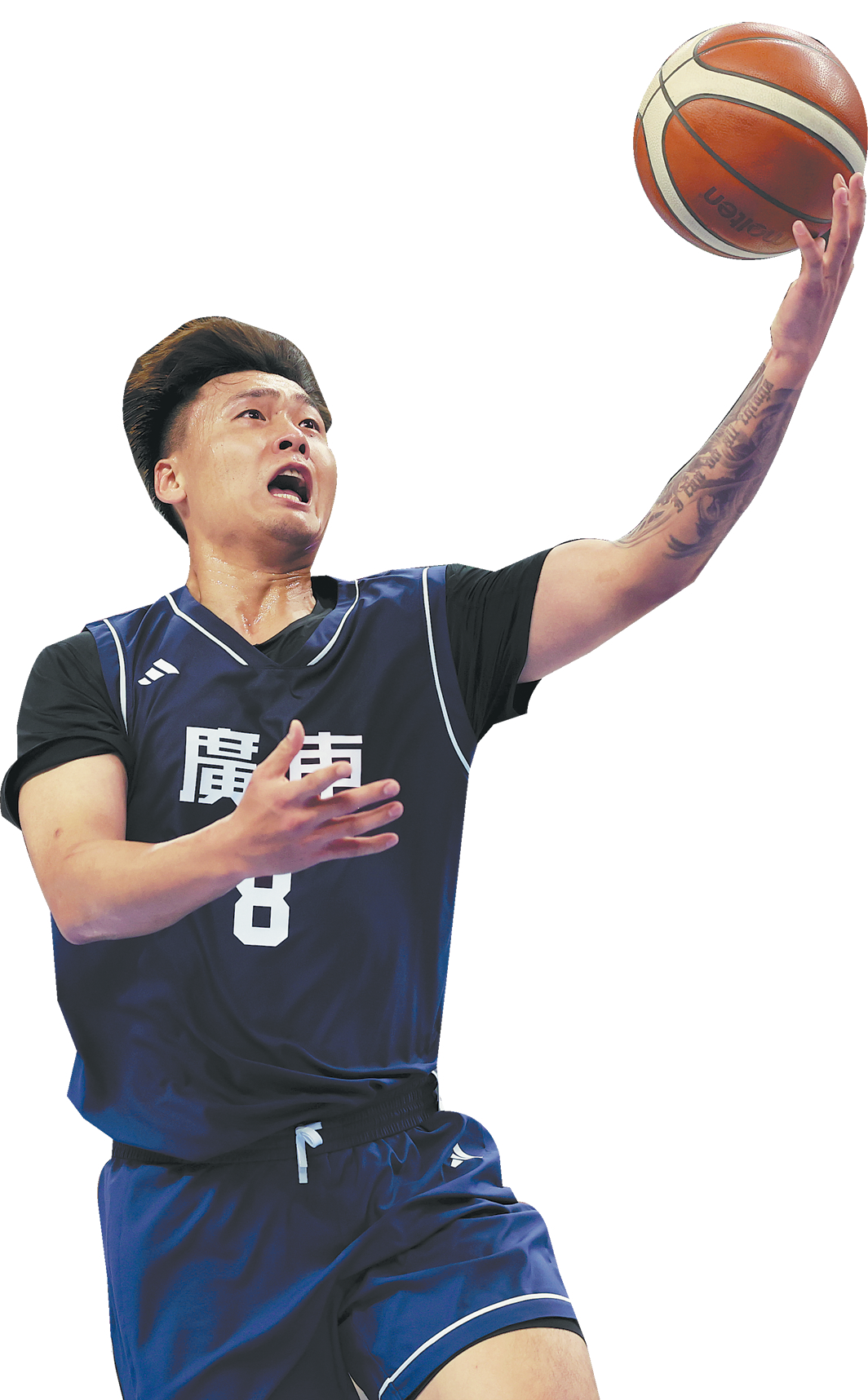
Farewell to a captain
Embodying all of those values, with two National Games titles and four CBA championships to his name, Liaoning captain Han chose the 15th National Games to close the final chapter of his 18-year professional journey — a farewell both personal and emblematic of the end of an era.
As Liaoning's captain, he led his teammates in cleaning the players' locker room after all matches concluded. "I want to stand my last post well," he said, "and leave the Liaoning team for the National Games in the best possible way."
Teammate Gao Shiyan expressed deep admiration: "Playing with him for so many years, he's more than a teammate, he's a brother. Even at 38, he fights so hard on the court, inspiring the entire team — he's our role model."
Zhou Qi, Han's former teammate and an opponent in the bronze-medal match with Sichuan, also sent his best wishes: "I can only wish him well, hoping he enjoys life even more now that there are no more games."
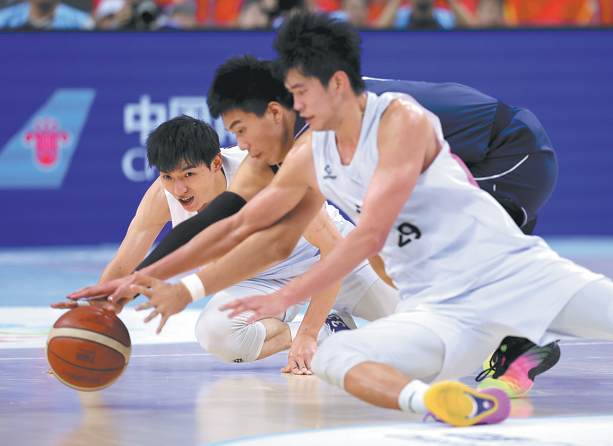
Han's career has been marked by dedication and loyalty. Since joining Liaoning in 2007, he spent 18 years with the team, remaining committed, even when offered record-breaking contracts by other clubs.
"I was born and raised in Liaoning. Contributing to Liaoning is what I should do," Han said.
During the semifinals at Dongguan Basketball Center, the arena was filled with Guangdong fans cheering loudly for the home team. After the match, the MC invited the crowd to salute Liaoning veterans Han and Li Xiaoxu.
"This is their last National Games as players. I think we should give them our applause, celebrate the Liaoning-Guangdong rivalry we've cherished, and honor our basketball youth," he said.
"To youth; never regret!"
Hong Kong pedal ace Ceci Lee Sze-wing's successful title defense in the women's road cycling individual event during the ongoing 15th National Games has once again turned the spotlight on the city's cycling team, which is known for its stellar show in premier tournaments.
Lee's gold is the second for the Hong Kong Special Administrative Region so far in this year's games, and she is also the third athlete from the SAR to triumph more than once at the National Games after Asian cycling legend Wong Kam-po and Olympian Sarah Lee Wai-sze.
While hard work and discipline form the mainstay of Hong Kong cycling team's medal-winning performances, the application of cutting-edge sports technologies developed through the joint efforts of the Chinese mainland and Hong Kong has been a significant contributor to its success.
A central research facility at Hong Kong University of Science and Technology, which specializes in developing high-tech aerodynamic and acoustic surroundings, boasts a low-noise wind tunnel that can simulate a cycling race environment.
This facility, when further empowered by the nation's Tianhe 2 supercomputer in Guangzhou, Guangdong province, can not only improve cyclists' riding postures, but also assist in the development of the most suitable bike design and cycling bodysuit for them.
Zhang Xin, director of the university's Aerodynamics and Acoustics Facility, highlighted the importance of using a supercomputer to develop sports technologies. As human muscle tissues and physical conditions constantly change, the computation process is complex and requires the use of a supercomputer, he said.
Athletes of the Hong Kong cycling team have worn aero-speed suits developed and tested in the wind tunnel to compete at various major sports events, including the Tokyo 2020 Olympic Games and the 2022 Asian Games in Hangzhou, Zhejiang province. These bodysuits, tailor-made for each athlete, are estimated to reduce wind drag by an impressive 3 percent.
Other sports disciplines, such as windsurfing and triathlon, have also employed simulations developed using the supercomputer and the wind tunnel to optimize the postures and movements of athletes.
During training sessions in Stanley on Hong Kong Island, sensors developed by the university recorded athletes' physical data, which was subsequently analyzed using the supercomputer.
According to Zhang, the Tianhe 2 simulated the wind conditions at the Paris 2024 Olympic Games and provided the information to head coaches of the windsurfing and sailing teams. The supercomputer helped to enhance athletes' posture optimization, as well as design and select equipment, he said.
Sports technology cooperation between the mainland and Hong Kong has deepened in recent years, with more agreements signed for further development, serving both professional athletes and the public.
In September, Hong Kong Polytechnic University and mainland sportswear brand Li-Ning signed a memorandum of understanding to establish the Li-Ning-PolyU Joint Research Centre for Sports Science, which aims to enhance technological application and promote industrial transformation in the sports and health sectors.
In Guangzhou, the Nansha Sub-Center of National Supercomputer Center provides the mainland's first supercomputer direct network line for Hong Kong. A dedicated high-speed fiber-optic network from the Tianhe 2 supercomputer is used to link Guangdong and Hong Kong's scientific innovation capabilities, enabling Hong Kong users to swiftly utilize the nation's supercomputing resources. The center has continuously provided support for technological innovation in Hong Kong and Macao.
For athletes from Macao and Hong Kong, traveling to the mainland for training and using sports technologies to improve their skills have become common.
Macao athlete Chan Man-hin, who participated in the National Games sailing event last month, said he was equipped with a high-end GPS tracker when he trained on the mainland. The device collected his performance data, including instantaneous speed and direction during sailing, for further analysis to help improve performance, he said.
"The piece of equipment allowed me to analyze all the training data and adjust my strategy for the day of the competition," Chan said.
The nation's support for sports development in its special administrative regions extends beyond hardware to include talent cultivation.
At Guangzhou Zhongshan Whampoa School for Hong Kong and Macao Students, a base has been established to provide a professional training platform for students from Hong Kong. Selected student athletes receive targeted training in five disciplines — fencing, swimming, equestrian, shooting and running.
These athletes also get more opportunities to participate directly in competitions at provincial, national and even international levels. By undergoing scientific and systematic training, they can gain recognition of the Sports Federation and Olympic Committee of Hong Kong, China, and have the chance to register as Hong Kong athletes, potentially becoming the city's elite sports representatives.
atlasshao@chinadailyhk.com

China's diving "Dream Team" will likely remain the dominant medal collector at the 2028 Los Angeles Olympics, backed by its deep talent pool and the divers' world-class performances at the National Games.
With a legion of multiple-time Olympic and world champions clashing at one meet, the diving program in Guangzhou, has, perhaps, outranked all other international events in terms of the quality of the field, making it, arguably, the toughest competition in the careers of China's best divers.
Athletes representing their respective home provinces, or municipalities, had to beat more world-champion-caliber opponents at the 15th National Games than they ever normally face at international events, to reign supreme in each of the 14 individual and team disciplines.
After winning the women's 10m platform gold on Monday, four-time individual world champion Chen Yuxi said she's even more pleased to see the collective rise of the younger generation than claiming her maiden National Games individual title.
"For competitive sports, having a steady stream of talent is more important than being strong alone in promoting the event's development," said Chen, representing Team Shanghai at the Games, which are being held in Guangdong province and the special administrative regions of Hong Kong and Macao.
Chen also won a gold medal in the synchronized 10m platform alongside diving partner Zhang Minjie last week.
According to official statistics from the 15th National Games, eight of the 12 athletes who competed in women's individual 10m platform were born after 2010, with the youngest, Liu Zihan, just 11 years old, demonstrating China's deep talent pool in the sport.
"To be able to compete with so many experienced and decorated older sisters, and finish on the podium together with them, I am just happy," Liu, who won bronze in 10m platform, said while looking up at Chen during the post-final news conference.

For the 20-year-old Chen, her own regret of having not claimed an individual Olympic gold yet, and only winning at the National Games this year, largely came down to the dominance of her national teammate, the seemingly invincible Quan Hongchan, who had been sidelined for almost half a year by multiple injuries, before making an impressive return in Guangzhou.
The 18-year-old diving prodigy drew loud cheers from a capacity crowd at the Guangdong Olympic Sports Center's swimming and diving hall on Nov 2, when she helped the Guangdong squad win the women's team discipline at the Games in her first official competition since May.
The teen master of the "splash-disappearing technique", referring to her deft body control that keeps the splash to a minimum when she enters the water, delivered once again, suggesting that she's not done yet, even having won back-to-back individual 10m platform Olympic titles by beating Chen both times at Tokyo 2020 and Paris 2024.
"I still believe I am competing well enough that I could complete a full set of dives with quality," Quan said after finishing fifth with Wang Weiying in the synchro discipline on Nov 5.
"I am not at my best now, but I am happy, and really enjoying the competition."
Chen, Quan's gold-winning synchro partner in Paris, welcomed the return of her friend and biggest individual rival, saying she expects Quan to return to her peak form soon, as their healthy competition always helps bring out the best in each other.
Women's reigning Olympic 3m springboard champion Chen Yiwen, 26, had to settle with a bronze in the individual final on Tuesday, beaten by her fellow Guangdong teammate and eventual gold winner Lin Shan and runner-up Chen Jia, representing Sichuan province.
"All the other divers have done pretty well, better than I did, in this final, showing how high the level of competition has been," said Chen Yiwen.
In men's events, Wang Zongyuan's surging form, underlined by his individual 3m springboard win on Monday, suggested that he will keep pushing Team China's drive to dominate the springboard together with two-time individual Olympic champion Xie Siyi, who won the synchro with Guangdong teammate Huang Bowen.
The duel between Shandong's Lian Junjie and Beijing veteran Cao Yuan on the 10m platform, where Lian won his national title by beating Cao on Tuesday, is expected to continue sharpening the pair's skills in the buildup to LA28.
"I am still a climber, in terms of achieving my career goal at the LA Olympics," said the 25-year-old Lian, who won his sole Olympic gold in men's synchro 10m platform with Yang Hao in Paris.
"China's diving team builds on its tradition that each generation passes on to the next, in order to always stay competitive and on top of the world.
"For the younger guys, I just hope they stay resilient and mentally strong to withstand the grind of hard training every day. Perseverance is the key to success."
China's world-beating diving squad swept all eight gold medals at Paris 2024, after collecting seven out of eight at Tokyo 2020.
Zhou Jihong, who came out of retirement to return as head coach of the national team in June, has sent a strong signal that the program will go all out on its journey to LA28, with its sights firmly set on another golden sweep.
Notably, it was Zhou who won the country's first-ever Olympic diving gold at Los Angeles 1984.
Contact the writers at zhengcaixiong@chinadaily.com.cn
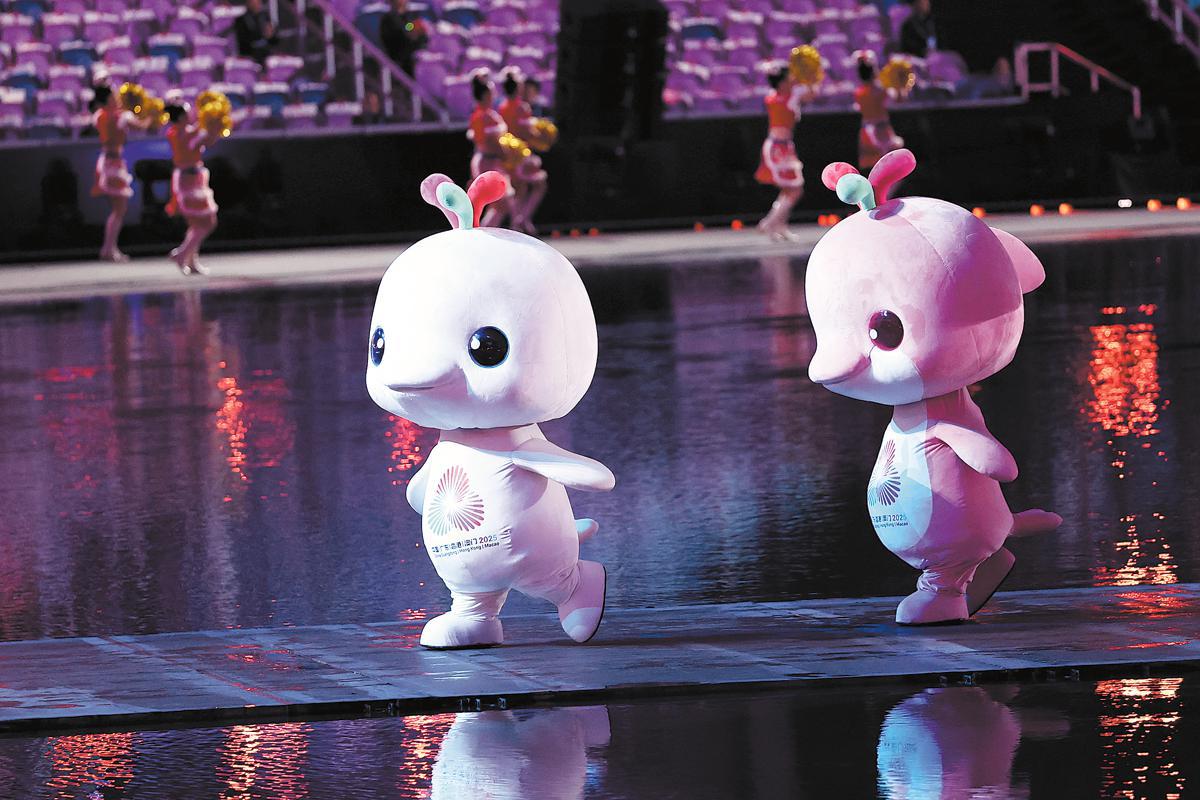
Through their headspins, high jumps and playful antics, the mascots Xi Yangyang and Le Rongrong, inspired by the Chinese white dolphin, have become the unexpected stars of the ongoing 15th National Games, stealing the show at venues across the three host regions.
Their design was led by Liu Pingyun, the mind behind the beloved Beijing Winter Olympics panda mascot, Bing Dwen Dwen. Liu explained the evolution: "Bing Dwen Dwen's barrel-shaped body, with no defined waist, limited its range of motion. This time, we gave Xi Yangyang and Le Rongrong a two-heads-tall proportion, which allows for much smoother and more dynamic movement." He noted that the new duo represents a clear step up in athletic expressiveness.
This design refinement not only makes the mascots more versatile in graphic depictions of various sports, but also grants the live performers inside the costumes far greater flexibility.
This enhanced mobility is on full display at venues like the Dongguan Basketball Center where, during timeouts, the mascots erupt with energy the moment the hip-hop music drops. They trade break dancing moves, rapid tail spins and even headstands, driving the crowd into a frenzy of cheers.
Videos of their antics have gone viral on social media, with many online declaring them the most energetic mascots they have ever seen. Photos of the mascots have been turned into memes in both Mandarin and Cantonese, sparking widespread speculation about who brings the characters to life with such infectious energy.
The answer, in part, lies in a group of 23 performers from the Foshan Huangfeihong International Martial Arts School, who were selected to bring the mascots to life during the opening ceremony.
"A solid martial arts foundation helps them adapt to the physical demands of mascot performance," explained Zhang Yingyan, the school's vice-principal. She added that the selection process emphasized not only martial arts skills, but also discipline and teamwork.
To prepare, the team began training as early as late July, practicing spins, jumps and arm movements to ensure their portrayal of the dolphins felt natural and lively.
When asked about the mascots' sudden internet fame, Zhang seemed pleasantly surprised. "We were completely caught off guard by it," she admitted. "We never expected them to become this popular."
The mascots' biological inspiration carries profound symbolic meaning. The Chinese white dolphin is a resident of the Pearl River Estuary, known as the "giant panda of the sea" and classified as a grade 1 national key protected species.
Adult Chinese white dolphins are typically white when calm, but turn pink when active due to increased blood flow — inspiring the dual color scheme of the cuddly duo.
Liu explained that the dolphin symbolizes the maritime culture of the host region — the Guangdong-Hong Kong-Macao Greater Bay Area.
"Chinese white dolphins are social animals that live and move together, reflecting the spirit of unity, perseverance and endeavor seen in athletes," he said.
He further emphasized the cultural resonance that the dolphins' annual return to the Pearl River Estuary symbolizes a profound connection to their homeland, reflecting the deep-rooted bonds among the people of Guangdong province and the special administrative regions of Hong Kong and Macao.
This symbolism proves particularly relevant given the Games historic joint hosting, representing a new era of regional cooperation.
"In choosing a representative for the Games, we deliberately selected a creature less familiar in daily life," Liu explained.
He noted that the Chinese white dolphin, residing in the ocean beyond our usual reach, perfectly symbolizes the innovative thinking and future-oriented vision of the Greater Bay Area.
"Our challenge was to transform this unfamiliar marine creature into approachable, engaging characters through design."
The mascots' final design depicts dolphins with rounded bodies, human-like limbs, and distinctive blue, green and yellow adornments atop their heads representing water spraying from their blowholes.
Yet, their appearance has sparked a wave of online humor, with many people affectionately dubbing them the "great bay chickens" — also a lighthearted nod to the chicken's revered role in Cantonese cuisine and culture. The nickname has since taken hold locally, further fueled by the Cantonese pronunciation of "chicken," which sounds similar to the word for "good fortune" and carries positive symbolism.
The mascots have inspired extensive creativity, appearing in fan-made videos, memes and cultural products.
Liu embraced the reinterpretation with openness and good humor.
"This kind of grassroots rebranding makes the mascots more approachable," he said.
"By tapping into the local affection for chickens, it draws people in and helps them connect more deeply with the cultural and athletic spirit the mascots represent. I appreciate that," Liu said.
xingwen@chinadaily.com.cn
Move beyond the roar of the crowd for a moment and the most powerful sound at the 15th National Games might be the friendly banter on a shuttle bus or the shared anecdotes over a meal.
As the first-ever National Games co-hosted by Guangdong province and the Hong Kong and Macao special administrative regions captivate the nation, the most enduring victories are perhaps being forged not on the podium, but through personal connections — deeper bonds that are bringing Hong Kong and Macao closer to the Chinese mainland.
A tapestry of unity is being woven, thread by thread, as young athletes cross boundaries to compete, and volunteers welcome them with the full-hearted support of a hometown crowd.
Rico Cheung Siu-hang, 23, a 110-meter hurdler from Hong Kong, who is poised to make his National Games debut this year, said he is eager to engage with his peers from other provincial delegations for the exchange of technical expertise as much as for the shared sense of camaraderie.
When athletes from across the country gather for sports events, they not only share "trade secrets", but also stories about their hometowns, about the local delicacies and hidden travel gems, Cheung said, noting that such anecdotal exchanges happen mostly over meals.
"It's in these moments that our visceral links form," he said, adding that these organic, off-track interactions over the years have profoundly enriched his perspective of different parts of China, fostered a more nuanced understanding of the whole nation and strengthened his sense of national identity.
In preparation for the National Games, Cheung honed his skills in Shanghai this August under the guidance of Sun Haiping, who also coached China's hurdles race star and Olympic champion Liu Xiang.
Cheung arrived in Guangzhou, the provincial capital of Guangdong, with the rest of the Hong Kong athletics team on Wednesday, days ahead of his competition, which is scheduled at the Guangdong Olympic Sports Center on Nov 19.
The hurdler said he is particularly ecstatic about the "precious time window" he is getting, which is a departure from his usually tightly managed competition itineraries, and plans to use it for a leisurely visit to the city's landmark Canton Tower. The 600-meter-tall multipurpose tower is nicknamed "Slim Waist" for its unique twisted design.
Big motivation
Hong Kong para-table tennis player Wong Yue-ching, who will compete in the 12th National Games for Persons with Disabilities in Guangzhou in December, said the anticipation of playing a match before a cheering home crowd offers special motivation.
"Competing on our doorstep means that friends and family members who've never seen me perform live can finally be in the stands," she said. "Having my biggest supporters witness the payoff of years of training would be a massive confidence boost for me."
Wong said she has noticed a groundswell of enthusiasm surrounding sports in Hong Kong in recent days, thanks to the city's role as a National Games co-host.
Promotional campaigns for the games have covered the city — from mass transit railway advertisements to prime-time television slots — and many of her peers are actively signing up as volunteers, she said.
"You can feel the buzz everywhere.... The games have clearly become more than just a sporting spectacle; it is like a citywide mobilization program, galvanizing substantial mass participation and drawing more passion for sports," she added.
Regional integration
The sentiment was echoed by those who have transitioned from competitor to contributor.
Former Hong Kong basketball player Leung Kwok-shing, who has been appointed as one of the SAR's volunteer ambassadors for the games, said he is experiencing the other side of the big-ticket games with a profound sense of duty and national pride.
The volunteer drive in the two special administrative regions has garnered enthusiastic public response, resulting in nearly 20,000 appointments — 16,000 in Hong Kong and 3,500 in Macao — according to the games' volunteer service department in the two cities.
Leung's motivation stems from his stint as a basketball player, during which he suffered injuries and received the care of volunteers. "I hope to switch roles and serve as a volunteer this time to contribute and give back," he said.
At a volunteer mobilization rally in Guangdong in October, Leung witnessed a powerful symbol of regional integration within the Guangdong-Hong Kong-Macao Greater Bay Area. A Hong Kong student currently pursuing studies at a Shenzhen university signed up as a volunteer for the Guangdong competition region.
"This kind of exchange, where we unite as volunteers, truly fosters the integration of the Greater Bay Area," he said. "We are merging our services and our cultures, which is incredibly meaningful."
Leung also voiced his feeling of deep encouragement after seeing a great number of young people supporting the games and national development.
"I can feel the younger generation's eagerness to contribute to society and the country," he said. "This initiative is vital. I hope it spreads, helping to accelerate the growth of their national identity and sense of belonging."
Shared future
On the front lines of this integration are volunteers like Lai Meileng, a 32-year-old primary school teacher in Macao. For her, volunteering for the games is more than just a call of duty; it is a chance to be a welcoming host and a tiny "spark" in a blazing fire of community spirit, as well as a profound opportunity to connect more deeply with the nation.
As a member of the event's transportation coordination team, Lai's role involves shuttling athletes to competition venues, becoming a mobile platform for cultural and personal exchanges. "We aren't just ensuring transportation; we are building bridges," she said.
Lai recalled her recent interaction with mainland athletes on a shuttle bus. "I introduced them to Macao, and they shared their hopes and dreams for the games with me. Even though we are from different places, the distance didn't matter. We felt like friends," she said.
Such interactions form the very fabric of a stronger national identity, which allows Macao residents to understand their mainland compatriots better, Lai said.
Her perspective is also uniquely shaped by her dual role as an educator and a volunteer. She sees this experience as a vital tool for fostering national sentiment in the next generation.
"I can tell my students that the distance between us and the nation's affairs, or even famous athletes, isn't as far as they might think. It can plant a seed in their hearts, showing them that our future is a shared, hopeful one," Lai said.
While physical infrastructure, like the Hong Kong-Zhuhai-Macao Bridge, has long facilitated travel between Macao and the mainland, Lai said she believes that events such as the National Games have the power to build a more robust connection — a human one.
"Previously, I might have thought national development was a distant matter. Now I see that I am intimately connected with the nation's development," she said.
"By fulfilling my own role well, I am contributing to the nation. When everyone plays their part well, the whole society improves," she added.
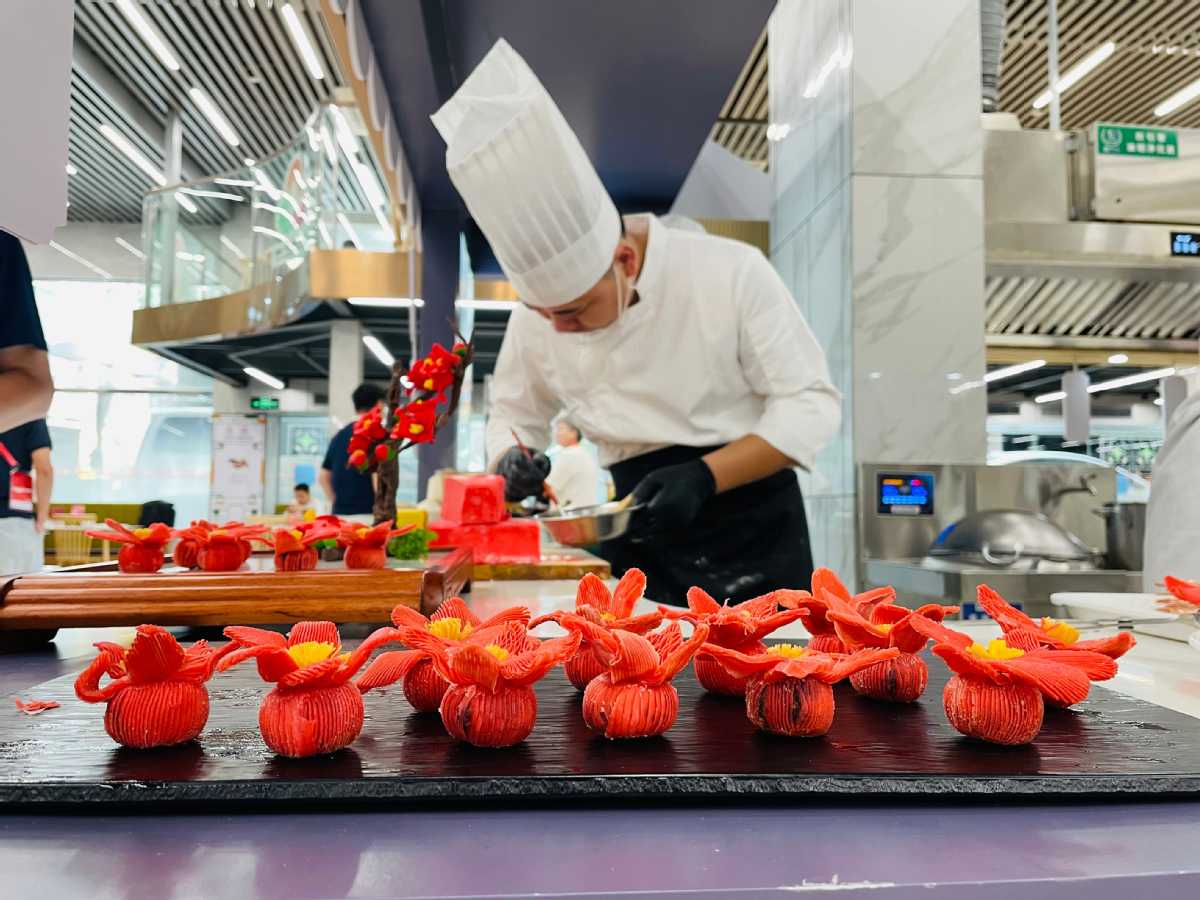
For athletes, the ongoing 15th National Games is a massive domestic sports platform to compete for gold medals. For thousands of spectators, the event is also an opportunity to taste cuisine from Guangdong province, Hong Kong, and Macao.
At the Games' main press center in Guangzhou, the capital of Guangdong, organizers have prepared styled dishes from cities across the province, such as shrimp dumplings, rice noodle rolls, braised goose, and beef balls.
Starting from Nov 9, 21 cities in Guangdong began taking turns hosting food-themed days at the main press center's restaurant, featuring 168 Guangdong-based specialty dishes.
During Wednesday's Shantou theme, braised goose, beef balls, and rice noodles were present, leaving domestic and international journalists covering the games impressed by the city's myriad ways of preparing rice noodles.
The games, jointly hosted for the first time in Guangdong, Hong Kong, and Macao, have attracted over 3,200 registered journalists from domestic and international media outlets.
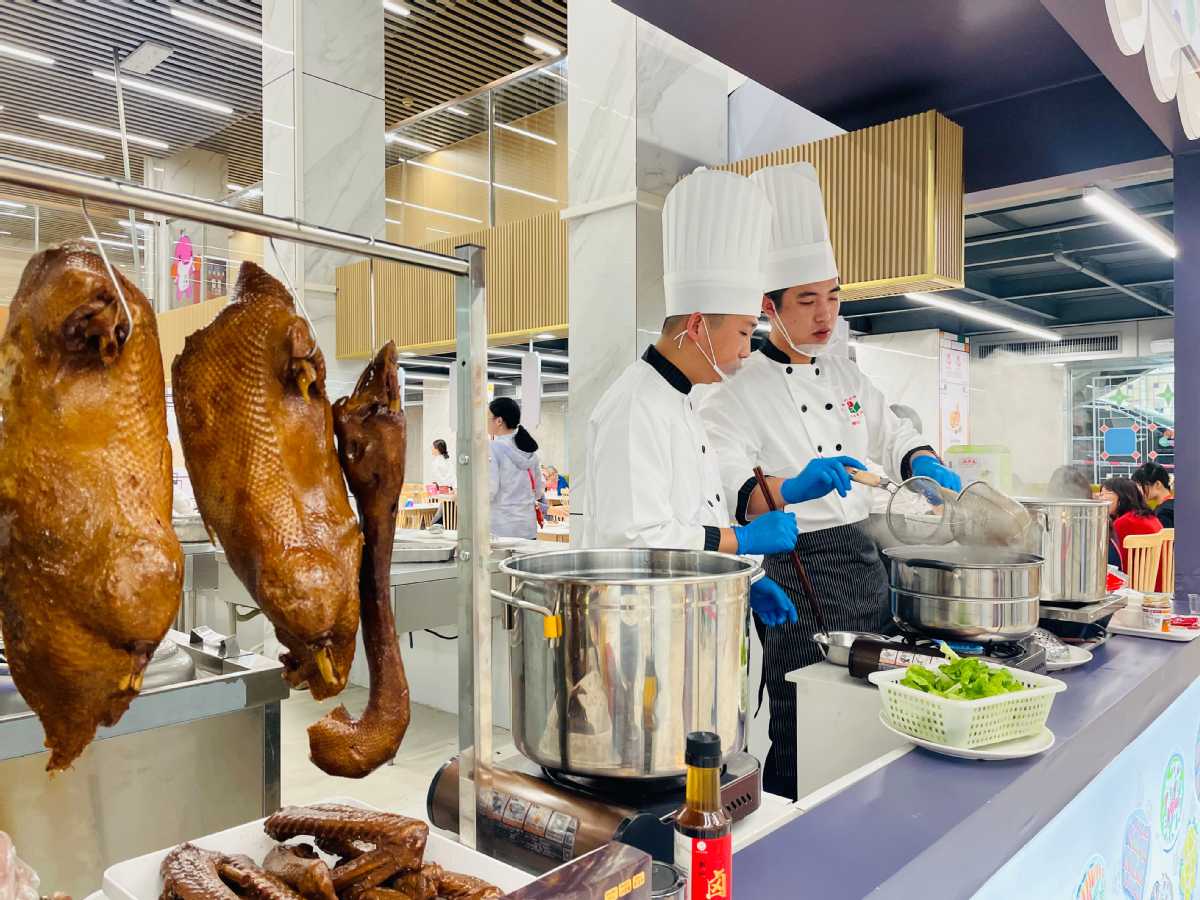

Composed, calm and radiating quiet confidence, Olympic champion Sun Yang faced reporters on Monday night after finishing sixth in the men's 400-meter freestyle final at the 15th National Games in Shenzhen, Guangdong province.
At 34, the three-time Olympic champion no longer shows the emotional tears that used to surface during interviews in his younger days. For him now, swimming is less about the pressure to win and more about the perseverance born of a pure love for the sport.
"Every race is the best test of my current form," he said. "There's no regret. Once a race is over, tomorrow is a new beginning."
The spotlight that evening belonged to 18-year-old Zhang Zhanshuo of Shandong, who stormed to victory in 3 minutes and 42.82 seconds, shattering his own world junior record.
Sun congratulated him poolside, offering words of encouragement. "Zhang is an excellent athlete with a long road ahead," Sun said. "I hope he can carry the future of Chinese men's mid- and long-distance freestyle."
"No matter whether it's young athletes or our older generation, I believe we can all move forward and go further. The era when everyone only focused on results is gradually fading. More often now, whether it's me or the younger athletes, what we display is the true spirit of competitive sports," he said.
Indeed, the cheers that greeted Sun's return to the National Games filled the arena. He said he has no plans to retire and hopes the competition will help him readjust his training — refining his methods to better suit his age.
"My persistence represents the final line of defense for my generation of athletes," he said. "I hope everyone will continue to look forward to a better, more complete version of Sun Yang in the pool."

Sun's journey back to the pool has been anything but easy. After serving a 51-month suspension, he returned to competition last summer, drawing enormous attention from fans and media alike.
At the National Games venue, spectators packed the stands from the preliminary heats to the finals, cheering his every stroke. On Sina Weibo, where he commands over 30 million followers, his post upon arriving in Shenzhen quickly garnered nearly 30,000 likes.
Although he didn't reach the podium in the 400m final, his name still appears beside the Asian and national records — a quiet yet powerful reminder of the glory he once brought to the pool.
Yet Sun must now accept that, with age, his performance is no longer at its peak. In the heats, he ranked eighth — only 0.1 seconds ahead of ninth place — barely qualifying for the final, where he swam in lane eight instead of his once-customary center lanes. All seven of his rivals were born after 2000.
In a previous interview with Sina, Sun admitted he had anticipated this. He returned to competition to assuage his passion, not a thirst for titles — doing so knowing full well that there would come a day when he could no longer be a champion.
"Even if one day I no longer hold Olympic or world records, I still have Asian and national records," he added with a small smile. "I've already achieved what most athletes can only dream of. I'm lucky — one of the fortunate few."
Despite his age, Sun continues to train with the intensity of athletes two decades his junior. Weighted sessions, ten sets of 800m swims — the workload remains immense. "At 34, the biggest difference is that places that never used to hurt now start to ache," he said. "To keep up, I have to work ten thousand times harder."
Cai Li, coach of the Zhejiang provincial swimming team, praised Sun's perseverance. "At his age, maintaining this level of training and competition is extraordinary," Cai said. "Very few athletes worldwide can do what he's doing."
Sun's focus now extends beyond personal victory. "When I was young, I wanted to win China's first men's swimming gold medal," he reflected. "Now, I want to break another barrier — to see how far an older athlete can go."
He hopes to adjust his training methods to better suit his physical condition, emphasizing longevity and adaptability over pure speed.
For Sun, retirement is not yet on the horizon. He knows his best days may be behind him, but his passion endures. "To achieve something great, you must go through storms and waves," he said. "That's what makes an athlete truly remarkable."
And when the time does come to step away, he knows exactly how he wants it to happen. "Whatever I do, I must see it through," he said firmly. "I want to end my career in the pool — even if I lose, even if I fall, it will be in the water."
SHENZHEN -- 13-year-old Yu Zidi of North China's Hebei province won the women's 200m individual medley at the country's 15th National Games on Tuesday, clocking a new Asian record time of two minutes 7.41 seconds.
In May, Yu secured a berth for the World Championships at Shenzhen after finishing second in the event at the National Swimming Championships in 2:10.63, the fastest time ever by a 12-year-old in the discipline.
At the World Championships in Singapore in July, Yu further improved her personal best to 2:09.21 in the final.
The previous Asian record of 2:07.57 was set by Ye Shiwen at the 2012 London Olympics.
The 15th National Games is bringing together many young volunteers who are devoting their passion and energy to this grand national event. Among them are Yao Zhengnuo from Hong Kong and Chu Cheng-wei from Taiwan, who provided support for the spectacular opening ceremony. What was it like to witness such a moment of pride? Follow us to discover their inspiring stories.

The 15th National Games, jointly hosted by Guangdong province and the Hong Kong and Macao special administrative regions from Sunday through Nov 21, mark the first time in Chinese sports history that three regions co-host a major national event.
This will not only deepen sports exchanges and cooperation between the regions but also foster emotional bonds among the three places' people, showcasing united strength in the Guangdong-Hong Kong-Macao Greater Bay Area's integration process.
This grand event, with significance in several aspects, resembles a cross-sea bridge, connecting history and the future, transforming the Greater Bay Area from blueprint to reality.
First, the joint hosting of the National Games marks a new milestone in Guangdong-Hong Kong-Macao sports collaboration.
In August 2021, the State Council, China's Cabinet, approved the three regions' co-hosting of the national sports gathering, featuring 34 competition events and 23 mass events, with an expected 26,000 athletes, 6,000 technical officials, 1,200 media personnel and 60,000 volunteers.
Venues span the three regions, including Hong Kong's Kai Tak Sports Park and Victoria Park Swimming Pool, and Macao's East Asian Games Dome.
This arrangement is complementary like puzzle pieces, pooling strengths: Guangdong's numerous venues, Hong Kong's internationalization and Macao's tourism facilities.
Since the Preparatory Committee was established in 2022, multiple meetings and activities have been held to enhance cooperation.
Ticket sales for the event are booming, reflecting public enthusiasm.
Sales began in August, with over 30,000 tickets sold on the first day, generating $1.7 million in revenue. The first week saw 100,000 tickets sold, totaling $3.9 million; by September, over 200,000 tickets yielding more than $7.7 million had been sold. Popular events like basketball, swimming and athletics have ticket sales rates reaching 90 percent. Ticket prices are affordable at $3.90 to $102.90. Sales momentum has exceeded expectations, showing the enthusiasm of sports fans.
This is not just about a sports craze but an emotional tie: Hong Kong and Macao residents participate in Chinese mainland events, strengthening a sense of belonging.
The economic and social benefits are significant. The sporting extravaganza is projected to generate over $2.3 billion in economic value in sectors like tourism, dining and accommodations. Guangdong expects 5 million visitors, with Hong Kong and Macao residents topping the list.
Data shows that Greater Bay Area tourism spending rose 16.4 percent in the first half of 2025, with the number of Hong Kong and Macao visitors to the mainland up 14.2 percent. The 15th National Games will stimulate tourism and consumption. The ripple effect promotes employment: Over 100,000 jobs were created during preparation, covering venue construction and volunteer services. On the social front, the meet has stimulated the development of grassroots sports: Guangdong has added 100 community sports parks, Hong Kong is promoting campus sports, and Macao has expanded fitness facilities. Enhanced enthusiasm in sports will sow the seeds for people's health to improve, enabling Greater Bay Area residents to share the joy of sports and reduce the burden of future medical care.
Deepening exchanges and cooperation is the core. The games feature over 20 joint events, like 3x3 basketball and esports, with mixed teams of athletes from Guangdong, Hong Kong and Macao. This mode fuses like a melting pot, breaking regional barriers and promoting exchanges of skills. In the first half of 2025, over 50 joint training camps were held, involving over 1,000 athletes. The 15th National Games' theme song and mascots incorporate elements from the three places, and they are expected to attract over 100 million online viewers. This acts as an emotional bridge, linking Hong Kong, Macao and mainland residents, strengthening a shared identity. As the Greater Bay Area integration accelerates, games-related infrastructure work, like high-speed rail expansion and airport upgrades, is expected to help shorten travel times among the three places to less than one hour.
The 15th National Games will bring long-term benefits. Upgraded venues will be converted to public use and are expected to attract 5 million visitors annually. The sports industry will grow further: The Greater Bay Area's sports market is projected to expand to be worth $38.6 billion by 2026. More important, cooperation and integration across the Greater Bay Area is expected to deepen, unleashing the economic potential of the city cluster, which has a population of over 86 million.
The author, a specialist in radiology, is founding convenor of Hong Kong Global Youth Professional Advocacy Action and an adviser to the Our Hong Kong Foundation. The views do not necessarily reflect those of China Daily.
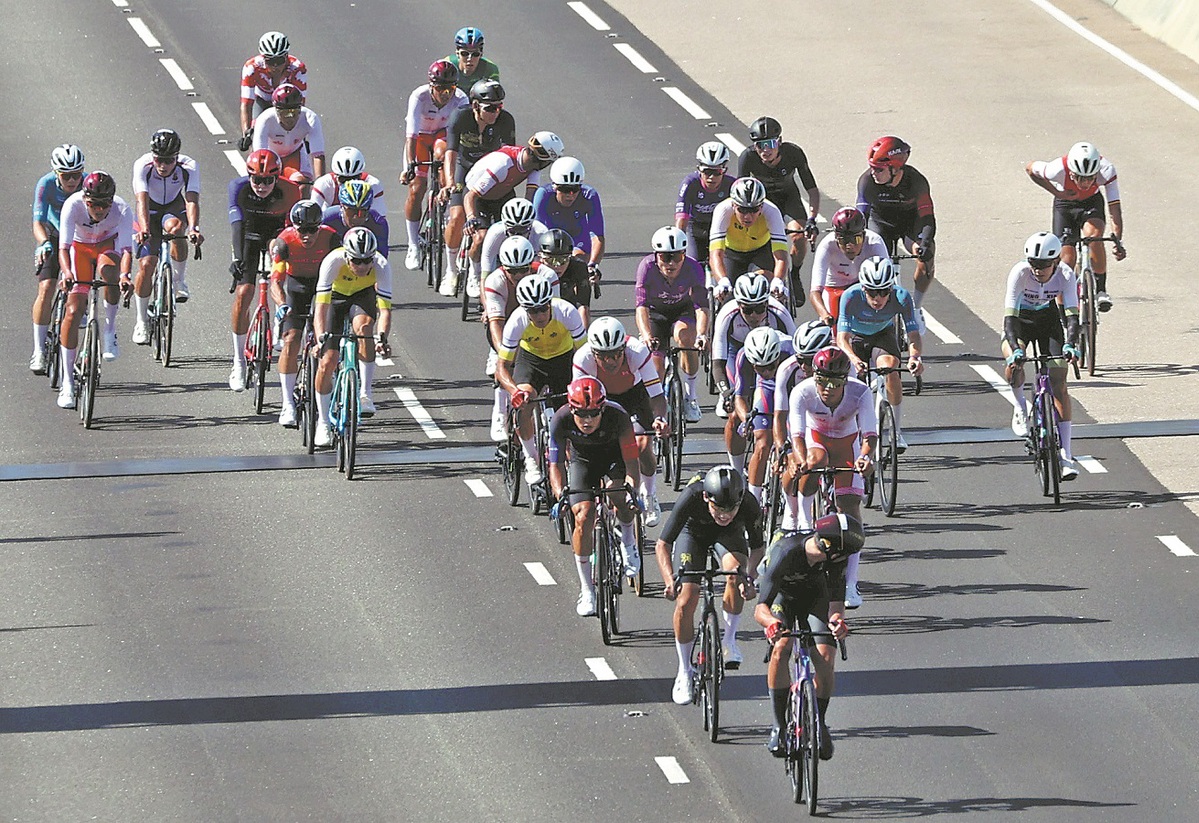
Crowds of people eagerly lined the railings on both sides of the scenic Qinglyu Road in Zhuhai, Guangdong province, on Saturday, as a sea breeze took the edge off the hot day. The spectators were waiting for over 100 competitors in the men's individual road cycling race at the ongoing 15th National Games.
Starting in Zhuhai, then passing through Macao's Taipa Island and Hong Kong's Lantau Island before returning to Zhuhai, the 231.8-kilometer race was a first for the games.
All three games hosts — Guangdong and the Hong Kong and Macao special administrative regions — were linked by a single competition, with riders passing through checkpoints six times without stopping. In the National Games' 66-year history, it was the first staging of a cross-boundary race.
This unique experience for both athletes and spectators was made possible by the ongoing integration in the Guangdong-Hong Kong-Macao Greater Bay Area. In recent years, this integration has been further enhanced by infrastructure development, boosting connectivity and mechanisms that make people-to-people exchanges more convenient.
Macao rider Kam Chin Pok said the event had deepened his understanding of connectivity within the Greater Bay Area.
"It's not just about this competition. Crossing the boundaries is becoming more and more convenient for the public. After the games, I believe people will know more about the Greater Bay Area and how integrated it has become," he said.
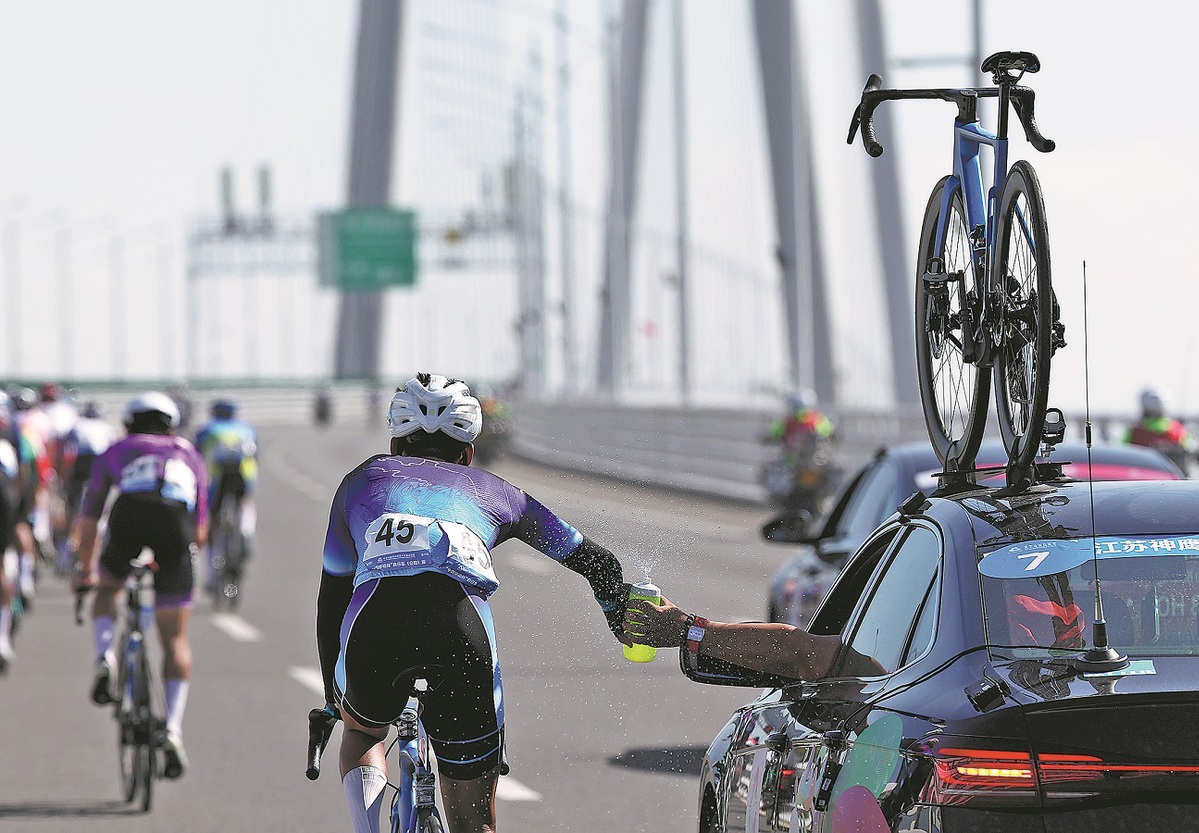
Kam, who competed in a trial race in November last year, said the experience of riding across the Hong Kong-Zhuhai-Macao Bridge — which opened in October 2018 — for a second time was still a great thrill.
"The Hong Kong-Zhuhai-Macao Bridge is truly magnificent. Most of the time, we can only travel on it by car. To get this close to the bridge on a bicycle and to feel the wind is a completely different experience, which I think maybe only the National Games could offer," Kam said.
Li Dongyu, who represented Tianjin, echoed Kam's view. He said riding on the bridge was an awe-inspiring experience as the scenery constantly changed, from cityscapes to sea views and tunnels.
"If not for this race, I might never have had the chance to travel between Zhuhai, Hong Kong and Macao, all in just over five hours," said Li, whose role was to collect water and other supplies from the support vehicle for his teammates.
Han Feng, deputy secretary-general of the Chinese Cycling Association, said racing on the bridge — which spans 55 km and is among the world's longest cross-sea bridges — was a bold and challenging concept.
The bridge stands approximately 50 meters above the sea, equivalent to the height of a 20-story building. As cyclists travel at speeds exceeding 40 km per hour amid the vast expanse of sea and sky, the strong sea winds hitting the peloton make maintaining a steady course no easy feat.
"Globally, no cycling race has ever covered 60.8 km on a cross-sea bridge. Despite the difficulty, this will undoubtedly become the highlight of the route," said Han.
Li from Tianjin also praised the efficient organization of the event. "At the crossing checkpoints, staff were waving flags to guide us at each crossing, and there were barriers along the road to prevent crashes. I could feel the support from the event staff in all positions, working to ensure we finished the race safely."

Game of tag
The smooth running of the race involved close cross-boundary coordination and technological innovation.
Min Yuntong, executive deputy director of the Zhuhai executive committee for the National Games, said the most challenging part was to ensure the accuracy and completeness of data. All support vehicles and equipment underwent clearance before the race, Min said.
Radio Frequency Identification readers, connected to the BeiDou Navigation Satellite System, were installed at checkpoints to instantly record athletes' wristband signals via RFID tags. With riders passing through at speeds exceeding 40 km/h, the system guaranteed an uninterrupted race.
Min said the rapid transmission and processing of data meant there were no race delays. "It can handle nearly 200 people passing simultaneously with an upload delay of less than 100 milliseconds. It has ensured the cyclists can pass the checkpoints with zero delay, zero contact and zero waiting time."
The idea of using the radio-frequency identification technology during the race was inspired by clearing private vehicles from Hong Kong and Macao fitted with RFID tags traveling to Guangdong via the Hong Kong-Zhuhai-Macao Bridge. The method ensures the uniqueness and security of access credentials.
Hong Kong team representative Tommy Wu Chun-yin was impressed with the method used for the race. Having registered the athletes' personal information before the race, teams were issued with exclusive wristbands and helmets fitted with multiple RFID tags. Following identity verification through facial recognition and fingerprint checks, participants entered a closed-loop management system for the event.
"Having the tags placed in various locations meant if one scanner missed a tag, another would pick it up, which I found very important. The wristband is also comfortable and doesn't feel restrictive at all," Wu said.
On Saturday, 103 athletes, along with their bicycles, completed inspection and clearance procedures and put on their wristbands. With the inclusion of support staff, a total of 257 people and 68 support vehicles smoothly went through the process.

Close quarters
At around 10:20 am, the race convoy entered the Hong Kong section of the event. The cyclists then tackled a 55.8-km segment that took them through the Hong Kong Port Artificial Island, the North Lantau Highway, and Penny's Bay Highway. The course offered a unique backdrop as it wound past Hong Kong Disneyland Resort, where athletes made a U-turn before heading back to Zhuhai.
To give the public a front-row seat to the historic occasion, a dedicated viewing area was set up along Fantasy Road near the U-turn. Riders sped past the venue at approximately 11:15 am, greeted by spectators' cheers and applause.
Among them were groups of students, including Form Four student Chloe Yeung, who witnessed a large-scale sporting event up close for the first time.
"It was so exhilarating to see the racers speed past right in front of me," Yeung said. "I knew this was a historic event — the first cross-border race linking Guangdong, Hong Kong, and Macao via the Hong Kong-Zhuhai-Macao Bridge. Seeing so many Hong Kong athletes participating was incredibly thrilling."
She said that such large-scale sports events are rare in Hong Kong.
"Realizing I was witnessing this inaugural cross-boundary event and that I could be here to personally encourage the athletes made me excited," she added. "The atmosphere was fantastic. I hope our school organizes more trips to events like this in the future — I would definitely join."

A teacher surnamed Cheng said that as the riders raced past, it allowed spectators to truly experience the intensity and speed of the event. He said it also helped him appreciate the extensive behind-the-scenes planning that made the race possible.
"Seeing everything, from the cyclists to the full complement of support vehicles, demonstrated a thoroughly well-organized and complete event," he said, adding his school will also take students to watch the rugby sevens event.
Form Five student Yu Xin-shun said that the joint hosting of the games provides an important opportunity to foster greater integration and development within the Greater Bay Area. It also facilitated valuable exchanges among young people.
"For example, having Hong Kong athletes participate in this competition creates meaningful opportunities for exchange," Yu explained. "We can learn from the Chinese mainland's advanced training methods and well-established sports systems, which are widely recognized for their excellence."
The race also attracted enthusiastic spectators on the other side of the border. In Zhuhai, parents brought their children to watch the race, and experience the spirit of the National Games on their doorstep.
Many Hong Kong residents made a special trip north to watch the start of the race. "I specifically came to Zhuhai and stayed overnight just to watch the race, even though it was over in a flash," said a resident surnamed Cheng. "With travel to the mainland being so convenient now, it's also good for a short trip."

Podium places
After over five hours of intense riding, a group of riders surged into view near the finish line in Zhuhai — their colorful jerseys drenched in sweat, pushing speeds of over 40 km/h.
At the front of the pack, several sprinters battled fiercely, teeth gritted, charging toward the finish line near the Zhuhai Museum.
After a nail-biting final sprint, Liu Zhicheng, who represented Shandong province, crossed the finish line first with a time of five hours, 17 minutes, and five seconds. He was followed by Beijing's Xue Chaohua and Yunnan province's Hu Haijie, with the podium places decided by mere centimeters.
Liu highlighted the unique challenge of the cross-boundary race. "The second half was run at a relentless pace, with no one holding back," Liu said at the post-race press conference. "It all came down to an extremely intense final sprint for position."
Liu said his team had prepared strategies to handle the crosswinds on the Hong Kong-Zhuhai-Macao Bridge.
"But during the race, the crosswinds on the bridge weren't actually very strong. The main challenge was the headwind on the way out and the tailwind on the way back," Liu said, adding that support for the event was well-rounded.
"From technology to operations, the whole mechanism of the race has been tested and proven. The pioneering model paves the way for greater integration of sports, culture and tourism across the Greater Bay Area," Min, executive deputy director of the Zhuhai executive committee for the National Games, said.
Eric Chan Kwok-ki, chief secretary for administration of the Hong Kong Special Administrative Region government, said at a news conference on Saturday that the event featured seamless real-time boundary crossings, with well-coordinated services and transportation at each checkpoint, fully showcasing the close cooperation among the governments of the Greater Bay Area.
Another cross-boundary event of the National Games, the marathon, will see athletes run across the Shenzhen Bay Bridge, connecting Shenzhen and Hong Kong, on Nov 15.
The 15th National Games is ongoing in Guangdong, Hong Kong and Macao. Chinese Olympic champion and former Chinese women's volleyball team captain Hui Ruoqi has sent her blessings, hoping that the spirit of sports will inspire everyone and spread joy and positive energy.
The ongoing 15th National Games mark the first time the Hong Kong and Macao SARs are serving as co-hosts of a national-level sports event. What does this mean for the future development of the Guangdong-Hong Kong-Macao Greater Bay Area? Watch the video to find out!
